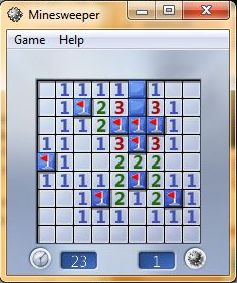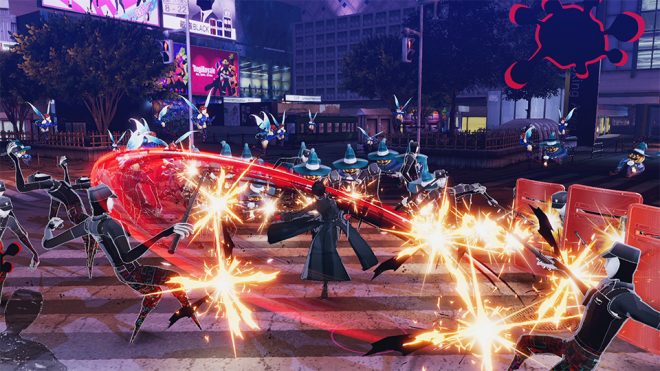Endgame Sucks (And Here’s Why)
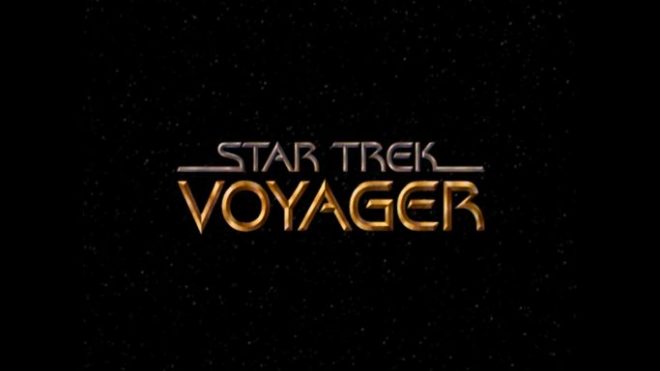
If success can be measured by how long a series lasts, Star Trek: Voyager was one of the more successful shows in the franchise. It ran for seven seasons, just like The Next Generation and Deep Space Nine before it. While not every episode was a winner, there were a lot more good episodes than bad.
But when the episodes were bad, they were horrid. Series veteran Brannon Braga had no excuse for writing “Threshold”. He was one of the writers from The Next Generation and by the time he wrote for Voyager, he was also an Executive Producer, so he should’ve known better. In fact, he was also one of the writers behind the absolute disaster of an Enterprise series finale, “These Are the Voyages…” That episode, despite possessing what was probably the best possible title for a franchise finale, was utter garbage, and is the second in my trifecta of least favourite Star Trek episodes.
As you’ve probably guessed, the third of those three episodes is “Endgame”, the Star Trek: Voyager series finale. Brannon Braga helped come up with the story for this episode, although the eventual script was not written by him. Incidentally, if I had to pick a fourth episode that I do not like, a good candidate would be “The Game” from The Next Generation, also written by him. I swear that I do not have a grudge against him.
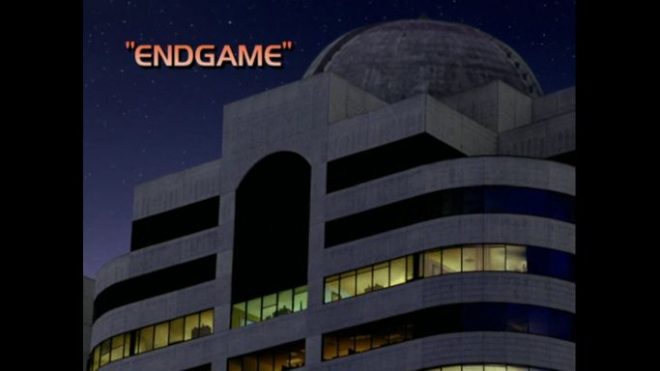
The biggest problem I have with “Endgame” is that it feels like the return home wasn’t earned by the crew. Instead of succeeding through ingenuity and hard work, the crew is given a freebie from the future. This may also be why I wasn’t all that thrilled with the ending to the Spider Robinson novel “The Free Lunch”, where the author goes to great pains to come up with a scenario where humanity is given a free lunch by people from the future in an effort to come up with an exception to Robert Heinlein’s oft quoted phrase “There ain’t no such thing as a free lunch.” At the end, these beings from the future are willing to sacrifice their own timeline in order to give us some freebies, including telling us about a device that can evenly microwave a coffee bean. It’s presented as a way to get something for free which no one has to pay for, but if the timeline is altered, these people from the future pay for this lunch with their very existence, assuming this doesn’t split the timelines, Kelvin-style.
The worst thing about this free lunch, as Star Trek video bloggers like Steve Shives have already pointed out, is that it appears at first glance that there’s no need for it. Everyone’s been living good lives aside from maybe one or two people who aren’t. Seven of Nine has died and Tuvok is suffering from a degenerative neurological disorder which would’ve been fixed quite easily if he’d been returned home much sooner. But, Harry Kim is in command of his own starship. The Doctor is married and has taken the name Joe. Naomi Wildman has a daughter. Reginald Barklay teaches a Starfleet Academy class about the Borg. Kathryn Janeway is an Admiral. Even Tom Paris seems to have come through his experiences well. And yet, Admiral Janeway tells Chakotay’s grave, “When I’m through, things might be better for all of us. Trust me.” How?! Nearly everyone’s already living the high life! Ten out of ten! A+, would buy again! Oh yeah, I forgot to say, Chakotay’s dead too, but the episode doesn’t treat his death as a bad end for him or go into any details so it’s assumed that his death was natural and not strictly as a result of whatever negative impact that a 23 year trip represents for the Voyager which a shorter, 7 year trip might fix. That said, the year of his death is the same year that the Voyager returned home, so it’s possible that the final leg of the journey is what killed him.
While I’m quoting from the episode, Admiral Janeway says to Captain Kim, “Our family’s not complete,” as a means to justify changing the past. The episode makes it quite clear that Seven of Nine and Tuvok and possibly Chakotay are the characters Admiral Janeway’s talking about, but given the minor characters that have been lost over the years, her words ring hollow. Unless, of course, she only considers the senior staff as family. If you aren’t listed in the opening credits, then sorry, you’re expendable. The most egregious of these expendable people are Joe Carey, a crewman who was notoriously passed over for the position of Chief Engineer in favour of Maquis crewmember B’elanna Torres way back in the second episode, “Parallax”, and who ultimately was killed in the episode “Friendship One”, less than 200 stardates before Admiral Janeway shows up to bring the ship home, which roughly converts to about two and a half months. Now, I know that for the sake of a tight dramatic narrative, Admiral Janeway can’t make a trip two and a half months earlier, prevent the circumstances of Joe Carey’s death and then wait two and a half months to reach the area of space she needs to be to enact her plan, but this is a time travel story, the question’s still going to come up. Also, according to extensive research one fan made of the entire series, there were 39 deaths including Carey among the crew of Voyager prior to the series finale. Apparently, none of these deaths affected the “family” that Admiral Janeway talks about, and only the 22 deaths between the seventh and twenty third year of Voyager’s journey seems to matter to the Admiral. One also wonders if Neelix is included in this family any more. Sadly, by the time Voyager got home in the original timeline, Kes would be long dead even by the standards of the space-faring Ocampa under the care of the Nacene named Suspiria, who was the mate of The Caretaker whom the crew met in season two.
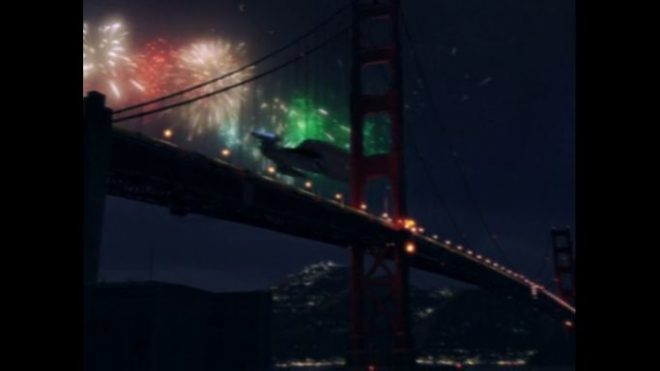
To me, “Endgame” represents one of the worst aspects of Star Trek: the oversaturation of time travel stories. To be fair, there really weren’t all that many during the entirety of the run between 1987 and 2005, but there were enough to make it an old and tired trope. Star Trek: Voyager (and then later Enterprise) treated time travel so mundanely that it ruined the trope for the rest of the franchise. It was Star Trek: Voyager that established there were time cops from the future and even incorporated them into a couple episodes. It was Star Trek: Voyager that established our technological development as a species came via a time paradox, the kind with no definitive beginning point – this paradox is more famously associated with the Futurama episode “Roswell That Ends Well” and is sometimes referred to as the bootstrap paradox, although Wikipedia prefers the term ‘causal loop’.
It was also Star Trek: Voyager that aired two episodes where future versions of the show’s characters embark on a mission to alter past events to the benefit of the present day crew. In other words, “Endgame” wasn’t even an original idea. The episode calls back to an earlier one called “Timeless”, written as the one hundredth episode of the series. In it, the crew is experimenting with a method of getting home and ultimately crash on a planet made of ice, with the majority of the crew perishing as a result. This time it’s Chakotay and Harry Kim who wish to alter the past to their benefit. Both episodes unintentionally raise the question that, if the crew of Voyager were the ones fighting to preserve their present from someone who wanted to change the past, would the grief-stricken would-be time traveller be in the wrong, since it would essentially be destroying the timeline that the series has worked hard to establish over the course of several seasons? But since the future timelines we see in “Timeless” and “Endgame” weren’t filmed painstakingly over the course of the years they supposedly take place during, we can apparently write them off and everyone’s okay with it. I can’t imagine that anyone watching Star Trek: Challenger would’ve been happy with Chakotay and Kim possibly erasing the voyages of Captain Geordi La Forge and crew.
The episodes in question also set a bad precedent for other such tragedies in the Star Trek universe. What makes the Voyager so special in that it can be “rescued” like this not just once, but twice? And are these the only times it has happened throughout the timeline? If the Voyager crew can decide to violate the Temporal Prime Directive for what are admittedly selfish reasons, what’s stopping other surviving crew from tragic accidents, trying to fix said tragedies? If anything, “Year of Hell” should’ve been a massive warning against messing with time to better your own life and the lives of others you’re connected with, except that the entire year was erased from history and thus no one, not even the scientist behind the technology that made the episode possible in the first place would’ve learned anything.
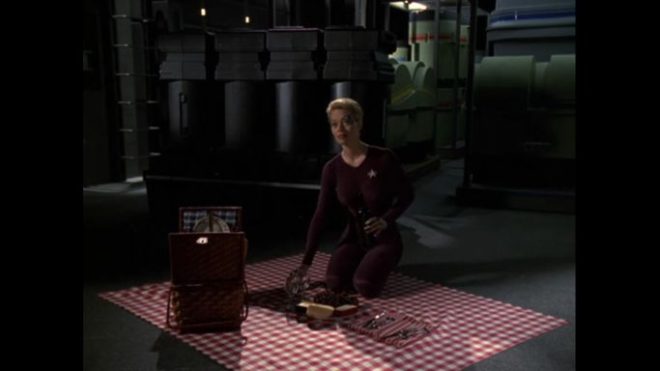
An interesting exception can be made for the Deep Space Nine episode “The Visitor”, where Captain Benjamin Sisko is being pulled through time and space due to a once in fifty years wormhole accident, anchored to the life of his son, Jake. By killing himself, Jake was able to rescue Sisko from his fate, although his entire life and (one would expect) the timeline up to that point was reset in the process. Although it falls into the same trap that “Timeless” and “Endgame” falls into, the sacrifice of Jake’s life is seen as more of a personal reset, and we don’t get the notion that a lot of good futures are being traded for one possibly better future. “Children of Time” and “Time’s Orphan”, also Deep Space Nine episodes, follow a somewhat similar pattern. In the former, the Defiant crew discovers a colony of crash survivors on a planet and it’s quickly revealed that these survivors are descendants of the crew, who were thrown back in time by the very accident that caused the crash, and in the end, it was intervention from Odo that reset the timeline and erased an entire colony of people, although the timeline itself isn’t otherwise affected. In the latter, a time portal affects Chief Miles O’Brien’s daughter Molly and sends her to a different period in time and space. She’s retrieved, but not before she’s aged up over a decade. The end of the episode has her older self sacrifice her hard life on the uninhabited planet she’d ended up on by finding and sending her younger self back. Like “The Visitor”, this episode erases several years of a character’s future but in this case, it’s on the most personal scale it could possibly be, only affecting one person, leaving the timeline otherwise unaffected.
Time travel was utilized on a more personal level far more often prior to Star Trek: Voyager. “City on the Edge of Forever” gave Doctor Leonard McCoy a very personal encounter with a woman in the past whom he desired to save from an accident that would’ve claimed her life. However, history was cruel and the saving of her life changed events to such an extent that the Nazis won World War II and Earth’s history was changed for the worse. In order to restore the timeline, McCoy had to let this woman die. Not just McCoy, but Kirk and Spock, too. The needs of the many had to outweigh the needs of the few, or the one. “Yesterday’s Enterprise” was a good episode for Tasha Yar, who had been murdered a couple years prior and when she found out what her original fate was, she decided to take her chances on the Enterprise-C. Captain Jean-Luc Picard had two really good episodes that dealt with time on a very personal level, and this doesn’t even include the Next Generation series finale, Star Trek Generations, or Star Trek: First Contact. In “Tapestry”, Q delivers an It’s A Wonderful Life style lesson by sending the captain back in time to the moment in his life he regretted the most, and thus he learned that he became the person he is because of moments like that in the past. One season prior, in “The Inner Light”, the captain experiences forty years in the life of a long dead scientist because of the influence of an alien probe. While not time travel per se, he still experiences the past in a way that the rest of his crew does not.
Star Trek: Voyager hit a few out of the park early on, but in later seasons would feel the need to outdo itself with episodes such as “Future’s End”, which introduced the timeships of the 29th century, and which put into question the need for episodes like The Next Generation‘s “Time’s Arrow” and Deep Space Nine‘s “Trials and Tribble-ations”. If there are entire crews charged with protecting the timeline in the future, why didn’t they step in and help? Better yet, the lack of intervention from both the Aeon and the Relativity made it seem like maybe these time cops are negligent in their duties. They would be far better equipped to stop people trying to alter the past, so they should’ve stopped the bad guys rather than leave it up to Captains Picard and Sisko, and they should’ve tried to intervene both times that Voyager’s characters tried to change the past. Instead, they give the impression that they find out after the fact that time travel shenanigans happen, shrug their shoulders and move on. Oh well, the alt-right Nazis haven’t taken over so this must still be the best timeline, Admiral Janeway gets a pass. I get that time travel is very complicated, but do the Voyager characters get carte blanche to do whatever they want with the timeline just because they’re main characters in a television show?
In the end, Admiral Janeway gets what she wants and brings the Voyager home after only seven years in the Delta Quadrant rather than the original twenty three year voyage home. She brings technology from the future that is able to curb stomp the Borg and much of the drama of the second part of the episode revolves around whether the plan of the Admiral’s is going to succeed. To be fair, the Borg Queen’s threats of assimilation make for excellent drama in the episode, but then Admiral Janeway takes all of the Queen’s power away from her with the line, “I’m not saying the Borg aren’t dangerous, but from my perspective, they’re thirty years behind the times. […] If I hadn’t developed technology and tactics that could defeat them, I wouldn’t be standing here today.” Sometime in the future, the Borg must’ve started developing technology and tactics that started to put Voyager at real risk, so Admiral Janeway did the same and then brought that technology back into the past. If the technology had been capable of defeating the Borg in the future, there was no way that it wouldn’t be able to do the same in the present. Voyager essentially brought end game weapons and armour along with a premium DLC character into the final boss battle with the Borg, a battle that was balanced around Voyager‘s seventh season capabilities and definitely not balanced around several more decades of level grinding.
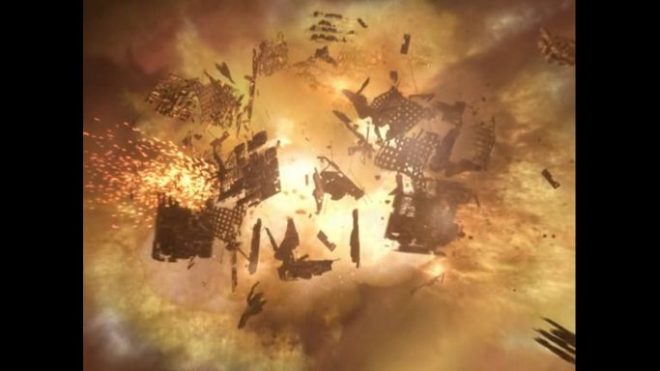
It’s actually a good wrinkle to have Captain Janeway modify her Admiral self’s plan in order to destroy the Borg’s transwarp network, but again, the technology at Voyager’s disposal in this episode made it an inevitability that the ship would return home.
Outside of the time travel aspects of the episode, “Endgame” also establishes plotlines that it would’ve been nice to have seen more of ahead of time. Chiefly, the relationship between Seven of Nine and Chakotay. It comes out of nowhere in the episode and although they’re shown at a very early stage in their relationship – they’re on their third date when we first see them – the episode tries to sell that they’re deeply involved already, to the point that they get married within the next three years, only for Seven of Nine to die tragically. This is meant to establish more drama later on in the episode when Seven and Chakotay argue about the future and attempt to talk out their relationship, but it would’ve been better if we hadn’t been expected to suddenly accept that they’re dating at the start of the episode. If anything, they should’ve established their relationship a few episodes prior, in “Natural Law” the two had a lot of time together due to navigational error.
A much better source of drama near the end of the episode comes when B’elanna Torres, having experienced false labour several times already, finally experiences actual labour and is about to give birth to her and Tom Paris’s child. Right when her labour begins, Paris is called away to pilot the ship through the transwarp hub and Torres tells him to go. He’s essentially expected to do his duty while feeling like he should be in sickbay with his wife. Given that this relationship has developed well over the course of several years, it’s a much better fit for the episode than randomly throwing two other prominent members of the crew together, almost like Worf and Deanna Troi in The Next Generation.
There was also ultimately no payoff to the Pathfinder storyline that was woven through the later seasons of the show. It was great to see that there was an effort made by Starfleet to bring the Voyager home, but their homecoming wasn’t by Pathfinder’s efforts, it was due to the free lunch they received from the future. It ultimately made Pathfinder pointless in the long run, which is unfortunate since they’d worked so hard to help Voyager return home, but if they found out ahead of time that all they had to do was wait for intervention from the future, one wonders if they would’ve been as motivated.
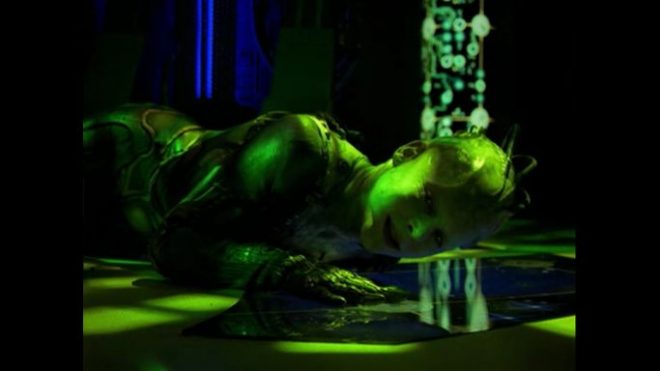
The bottom line for me is that this episode doesn’t do enough to wrap up the series. About the only real planning the writers did to prepare for the ending was to wait a couple weeks before the finale was to be broadcast to jettison Neelix onto a random Talaxian colony ship that they happened to find so far out of Talaxian space that it’s almost a deus ex machina. They were essentially telling him “Thanks for your help, but you don’t get to see Earth either.” To be fair, considering that Kes had left the show and Neelix hadn’t hooked up with anyone else in the years since, he would’ve been a very lonely Talaxian if he’d been brought to Earth with the rest of the crew. Still, he’d put a lot of work into helping Voyager, and this was the thanks he got. At least he didn’t get killed like Carey.
If “Endgame” was more of a bookend, I would’ve been happier, but it plays more like a footnote. It was nothing like the season finale for Star Trek: The Next Generation, “…All Good Things”, which wrapped up the series so well that it set what might’ve been an impossible standard for the rest of the franchise to live up to. Sadly, “Endgame” falls far short of the mark, although it’s fortunately not the worst of the series finales and I can freely admit that it is a bad episode but I was entertained watching it.


